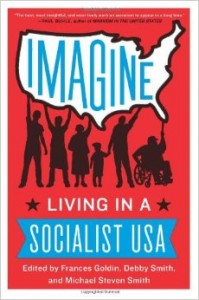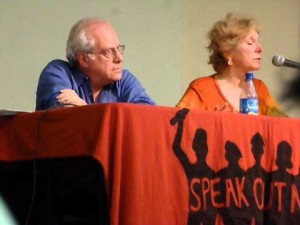Podcast: Play in new window | Download
Updates:
- Remembering Pete Seeger and the Almanac Singers of the West Village
- Eli Smith’s Article on Pete Seeger
- Michael Ratner on President Obama’s NSA Reform Speech
- Michael Ratner: Bouquet of Roses To The National Security State
—–
Imagine: Living in a Socialist USA
We continue to discuss the essays within the anthology Imagine: Living In A Socialist U.S.A. assembled and edited by our own co-host Michael Steven Smith, his wife Debby and Frances Goldin. Some of the most prominent activists, artists and experts have given their perspective about how the United States could exist as a socialist society. We’re joined today by Harriet Fraad, a hypnotherapist & psychotherapist in Manhattan. She is a contributor to the book with her essay Emotional and Sexual Life in a Socialist America written with Tess Fraad Wolff. Professor Rick Wolff joins us as well, we talk with him about his essay in the book titled The Shape of A Post-Capitalist Future.
- The willingness to ask the question. Can we do better than capitalism is what was the unifying theme across all these audiences. (regarding recent speaking tour) I think it should give encouragement and heart to everybody listening to this program, to understand how profoundly the wind has changed culturally, and ideologically and philosophically in the United States.
- Capitalism is generating its own critics, its own opponents at a breath taking rate.
- The way to get those people to rethink what socialism means is to revive parts of socialism that have gotten lost over the last century but I think now need to be put in the foreground.
- That’s how its going to change your daily life.
- What I concentrated on in the article is what would it mean if the place where people spend most of their adult life – at work – five out of seven days, best hours of each of those five days, you’re in your work place.
- Let’s talk about what socialism would mean differently from the way capitalism organizes it.
- In a capitalist workplace what most Americans have to face is that its a stunningly undemocratic arrangement.
- How about we democratize the work place? How about we bring democracy to the place it should have been introduced first in our society’s history, if we’re democratic, rather than last.
- That the workers should decide in assemblies, what to produce, how to produce, where to produce and what to do with the profits that after all, all the workers helped to produce.
- The major source of inequality of wealth is how businesses their net income. Their profits. Who gets them?
- They give their top official 200 hundred million dollar bonus packages, 50 million dollar bonus packages and what they don’t give to their top executives they pay out in dividends to their shareholders.
- 5 percent of the shareholders own 80 percent of the shares. If you distribute to shareholders, to distributing to unequal distributions of wealth.
- Socialists want those decisions to made democratically, by all the workers.
- If the workers together made the decision on how to distribute the profits they all helped to produce, you think they would give millions of dollars to a few top executives, while everybody else has to borrow money to send their kid to college.
- I want people to imagine how much better life would be if you handled the organization and the decision making in the enterprises of this society.
- This isolation that Harriet spoke of so movingly is catastrophic politically as long as we all act individually. We have to face and recognize that there are millions of people that want to go beyond capitalism.
- The first order of business is to bring them together in union and solidarity. They can have an impact on this society far beyond what they can achieve individually.
- I also work at being honest in not knowing how best to get people to be together and function together.
- If we could begin to mobilize. . .its important to understand that many of the ideas in this book are already majority points of view.
- When you go to work for another person in a capitalist system, an employer, and you sit down and you work out what you will do and you also work out what that employer will pay you.
- You know that the following is true. The only reason that employer will ever give you 20 dollars an hour is that during that hour, your brains and your muscles produce more than 20 dollars worth of stuff for that employer to sell. The employer will only give you 20 if he gets from you more than 20.
- That is a fundamentally unequal relationship.
Guest – Rick Wolff is Professor of Economics Emeritus, University of Massachusetts, Amherst where he taught economics from 1973 to 2008. He is currently a Visiting Professor in the Graduate Program in International Affairs of the New School University, New York City and directs the website Democracy At Work. Rick hosts the syndicated radio show Economic Update broadcast out of WBAI 99.5 FM.
——
- For most people, what they’re aware of is, unemployment is crushing their future or their present but they’re unaware that its crushing their personal lives as well.
- The first thing about capitalism is that what matters is profit.
- In order to profit, companies have outsourced American’s livings. From everything to manufacturing to accounting where you could fax the materials over to India where they speak English or law in terms of writing a brief, can be outsourced.
- People have been utterly looted in their personal lives because of only being a cipher on a profit ledger, not a person.
- 80 percent of the jobs that were lost during the recession were “male” jobs, in manufacturing, or construction which is often prefab or farmed out or jobs that require physical strength, that’s not really required anymore.
- There are two basis for male identity in the United States. One of them is having bread earner role and the other is having a loyal sexual partner and wife, and they’re both out the window.
- 70 percent of divorces are now initiated by women. Women are refusing to get married in the first place.
- Men are being rejected by women and by jobs.
- A lot of manhood has to do with pride, which in the United States has been replaced by shame. Shame is something the Republicans try to cultivate in anyone who doesn’t have money.
- The shame of not being a real person cause you can’t go out and buy stuff.
- The shame in not being able to support a wife and children. Shame easily leads to violence.
- Men have been rejected and are furious and don’t understand that its capitalism that has disempowered them.
- Americans don’t have the benefits of after school care, quality, free health care.
- People are disempowered and confused. Women don’t want to take care of men who won’t be able to support them and still demand full emotional and sexual services as well as child care.
- The biggest increase in married couples are couples that don’t have children. The biggest increase in households are single person households. People are alone.
- If you’re poor and alone, you can hang out at the mall and get arrested.
- People haven’t made the connection. Hey, honey its capitalism, nothing personal.
- They feel its their personal loss, which is why Americans which are 6 percent of the population of the world take 60 percent of the psych drugs.
- Porn which is often impersonal and degrading to women – hetero porn, is the way kids get sex education here. Porn is so profitable.
- The whole idea that the most important thing is connection is a socialist value. It’s all of us together. What we have is our majority and our connection that keeps this world going, rather than capitalists and their money to which we should all pay and obey.
- Americans at the point where they know this is an unjust system but they’re not quite at the point where they can say, and I will do something about it.
- You need to be willing to join with other people. That’s the primary thing.
Guest – Dr. Harriet Fraad, a hypnotherapist & psychotherapist in Manhattan. She is a contributor to the book with her essay Emotional and Sexual Life in a Socialist America written with Tess Fraad Wolff.
——————————————————————————-

